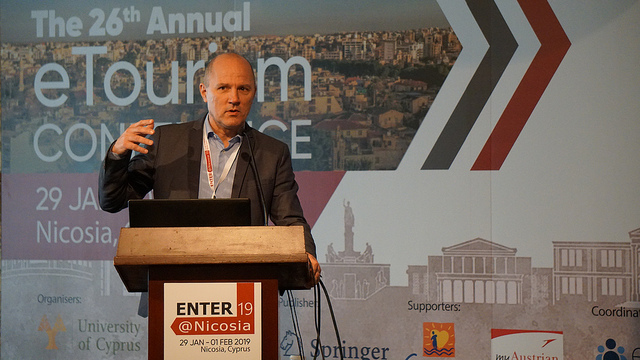One of the key themes at this year’s ENTER were artificial intelligence (AI) and robotics. The emergence of increasingly powerful computing technology combined with ever more affordable prices has brought about new ways of doing business, effectively allowing forward-looking tourism companies to automate some – or all – of their routine front- and back-end tasks.
ENTER2019, a leading eTourism conference organised annually by the International Federation for IT and Travel & Tourism (IFITT), was held this year in sunny Nicosia, Cyprus on 29 Jan – 1 Feb. Renowned for its topical debates, inspiring keynotes, and highly practical workshops, ENTER has brought together leading academics and industry professionals in travel and technology since 1994. Over the years the conference has firmly established its place as a platform showcasing cutting-edge research in eTourism and shedding light on current developments as well as future challenges in the space. “Organising ENTER forms a key part of IFITT’s activities and celebrates the Federation’s dedication to bringing value to society at large,” says Iis Tussyadiah, IFITT President.
One of the key themes at this year’s ENTER were artificial intelligence (AI) and robotics. The emergence of increasingly powerful computing technology combined with ever more affordable prices has brought about new ways of doing business, effectively allowing forward-looking tourism companies to automate some – or all – of their routine front- and back-end tasks. Furthermore, recent advances in machine learning and big data analytics have made it possible to, not only make more accurate predictions and forecasts based on unstructured data, but to also continue learning from emerging behaviour in ways that have not been possible before.
Working at the forefront of these developments are Urska Starc-Peceny and Tomi Ilijas from Slovenia-based Arctur Technologies. In an illuminating keynote entitled “Tourism 4.0,” Tomi outlined Arctur’s plans for bringing the tourism industry to the digital era once and for all. Using Slovenia as a nationwide “living lab”, Arctur is pioneering AI and blockchain technologies that completely change the way people consume travel experiences. At the core of their innovative approach is a novel credit-based system for tourists. Travellers seeking visas to Slovenia are granted a certain amount of personal credits upon entry. These can be used to purchase goods and services from small, independent producers spread across the country. The idea is to boost local economies by encouraging travellers to seek experiences off the beaten path and explore what the country has to offer more holistically, whilst simultaneously facilitating safer transactions free from exchange fees. Transactions are made safe by the clever use of distributed ledger technology.
In addition to clever business applications, AI and robotics were also very much front and centre in the academic debate of the conference. For example, Stanislav Ivanov of Varna University of Management, discussed the macro-economic and political implications of robotised societies at large. In his view, the case for increased robotisation is clear: our economies rely on continuous growth, but because of falling birth-rates combined with longer life expectancies, global productivity in services is falling simply due to lack of hands. “As societies, we’re faced with two choices, really: either we need to start making more babies, or we need to implement robotics where possible in order to do more with less people. Telling people how many children they can and should have has never worked out well; robots simply make more sense, both short- and long-term,” says Stan.
But how exactly should we start robotising our lives? Where to begin, and why? The impending robot revolution raises countless ethical issues which need to be addressed sooner rather than later according to Marianna Sigala of University of South Australia. In her thought-provoking presentation, Marianna voiced concerns over job displacement, biased algorithms, increased surveillance in the pretext of hyper-personalised products and services, as well as the gradual disappearance of “humanness” in travel and tourism. A workshop facilitated by Ulrike Gretzel of Netnografica picked up on the latter and further illustrated the ways in which AI and robotics are already changing interactions with services through type/touch, voice, and gesture, in relative order of importance.
Naturally, these new ways of interaction give businesses more opportunities to get to know their customers better, leading to more optimised service offerings. Also, the abundance of data might also unlock new knowledge and lead to innovations that would otherwise go unnoticed. Although, there are several examples of AI-mediated experiences gone wrong, with the inevitable technical hiccups causing service failures. Related issues of cybersecurity, data privacy, and the deliberate manipulation of human behaviour have become hot topics amongst the techno-sceptics. More research is required to better understand the nascent relationship between the humans and the increasingly intelligent technology that gradually surrounds us. No doubt that the IFITT community will continue pushing the boundaries of eTourism further and provide cutting edge research related to this topic.
The next ENTER Conference will be hosted by the University of Surrey’s School of Hospitality and Tourism Management on 8-10 January 2020 in Guildford, UK.
Vicky is the co-founder of TravelDailyNews Media Network where she is the Editor-in Chief. She is also responsible for the daily operation and the financial policy. She holds a Bachelor's degree in Tourism Business Administration from the Technical University of Athens and a Master in Business Administration (MBA) from the University of Wales.
She has many years of both academic and industrial experience within the travel industry. She has written/edited numerous articles in various tourism magazines.






















































































































































































































